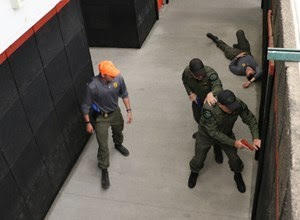PepperBall LifeLite Launcher
PepperBall launchers provide highly effective personal protection at home, during recreation, at school and in the workplace. PepperBall LifeLite accurately propels small, non-lethal plastic projectiles filled with potent pepper powder, quickly disabling assailants.
LAKE FOREST, IL — United Tactical Systems, developer of the world’s leading non-lethal professional and personal defense products, announced that its innovative and easy-to-use personal protection device, PepperBall LifeLite, is now available to the public. PepperBall has been in use for over two decades by more than 5,000 law enforcement and military agencies, but has not been available to the public until now. PepperBall offers an effective solution when lethal force is not warranted or permissible and is ideal as a non-lethal option at home, places of worship, while traveling, in schools and the workplace.
PepperBall LifeLite personal protection devices can be openly carried and are user-friendly. These launching devices use CO2 cartridges to accurately propel small, non-lethal plastic projectiles 60 feet at a velocity of 270 feet per second. On impact, these projectiles burst open to create a cloud of potent, debilitating pepper powder. The powder is designed to painfully disrupt normal function of the eyes, nose, lungs, and central nervous system, halting the immediate assault but without causing permanent bodily damage. PepperBall need not hit the body to be effective; the projectile can strike proximately and still overwhelm the assailant. The technology can also impact assailants even when they are not in the direct line of sight. Unlike pepper sprays and “stun gun”-like devices, PepperBall LifeLite gives users the advantages of time, distance, and accuracy. These in turn give users the confidence to carry and use the device when necessary. Read more










